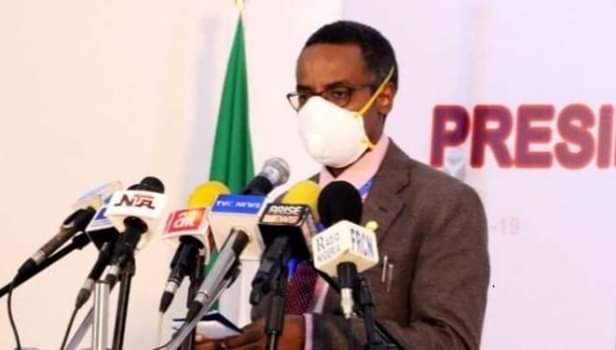
WORKERS in the banking, construction, manufacturing and food processing sectors are free to return to operations from Monday, the Federal Government gave the green light on Wednesday.
Also to return to work are senior government officials.
All those involved are expected to respect the laid down protocols.
The Presidential Task Force (PTF) on COVID-19 outlined this on Wednesday in Abuja while elaborating on the gradual easing off of the lockdown to contain the Coronavirus Pandemic has announced by President Muhammadu Buhari.
The President in a broadcast on Monday said partial return to normalcy would begin on Monday to prevent the collapse of the economy while stepping up the battle against COVID-19.
He imposed 8pm to 6am curfew across the country and a total lockdown of Kano State where positive cases have risen astronomically.
The PTF said the gradual return to normalcy will take six weeks.
Schools and the aviation sector will remain shut for now, the government said.
National Coordinator of the PTF on COVID-19, Dr. Aliyu Sani, said banks will be allowed to open from 8am to 2pm daily while observing the new restrictions.
Dr Sani said temperature test, respiratory hygiene and restriction of gathering of not more than 20 persons must be adhered to.
He said: “For government offices, government staff will be allowed to resume but it will be based on specific grade levels and specific days so that we can reduce the amount of congestion that we might have in our government offices and we will be discussing further with state governments to make sure that we have a common approach to this.
“Banks will be allowed to open but there will be restriction in the opening hours to between 8am to 2pm and together with all the other preventive measures I have already mentioned.
“In addition to this, from the point of agriculture and rural development, companies involved in food processing can commence operation.
“In construction sites, critical road will be allowed but waivers will be provided by state governments to enable movement.
“For the manufacturing and pharmaceutical industries, we will encourage shift work and limiting staff to only 30 to 50 per cent to maintain social distancing and pharmacy shops may remain open overnight.”
Sani added that restrictions on social gatherings remain suspended pending review of the new measures put in place by the government.
Neighbourhood markets are allowed to operate during the relaxed lockdown while
“Restaurant will not be opened to the publics but will be allowed to engage in home delivery of food.
“Schools will remain closed till further evaluation. Schools are encouraged to continue with e-learning and virtual teaching.
“Social activities such as the use of recreational parks. Communal sports, concert, social parties and movie theaters will be suspended until further review.
“Neighborhood markets will continue to open with the same standard and restrictions that we have applied in the past as well as supermarkets, and retail stores.”
“There will be general pieces of advice, for instance, discouraging persons above the age of 65 and those with mobility challenge from co-mingling with the general public so that they protect themselves from catching COVID -19 because they are the ones that are most likely to develop severe illness.
“We will be providing additional details and hopefully the implementation guidelines and the protocols will follow over the next day or two to allow businesses and offices to prepare for these changes,” he added.
He said the task force would engage with state governments to make sure that the PTF have a common approach to the opening of offices.
The chairman of the PTF Mr Boss Mustapha, who explained that the process of reopening the economy would span six weeks, announced a new set of protocols and guidelines
According to him, Nigerians will still not be expected to travel outside their current state of residence to any other part of the country.
He said: “In line with Mr. President’s directive, the PTF has developed sector specific guidelines. The gradual reopening of the economy will span a total of six weeks broken into three tranches of two weeks each.
“This phased strategy is designed to reduce the pains of socio-economic disruptions while strengthening our public health response, which would ultimately reduce the recovery of our economy and provide succour to the poor and vulnerable.
“State governments are encouraged to provide leadership in engaging relevant associations responsible for various sectors e.g market associations and transport unions for orderly and effective implementation.
“Similarly, security agencies are to strictly enforce these new measures that have been put in place.
“Inter-state travels are banned except for the movement of goods, agro-products, petroleum products, essential services, etc such as directed by Mr. President.
“The management of various offices, premises and businesses that will be gradually re-opened are mandated to ensure that the following preparatory steps are taken:
⦁ Fumigation and decontamination,
⦁ Arrangement made for physical distancing;
⦁ Provision of hand sanitizers and hand washing facilities;
⦁ Application of the policy on mandatory use of face masks;
⦁ Provision of thermometers for temperature checks;
⦁ Consideration must be given to persons living with disabilities while making all these arrangements;
⦁ Increased communication with staff on COVID-19 and measures put in place; and
⦁ Any other measure that may be peculiar for the organisations and/or sector;
He added that “mass gathering of more than 20 people outside of a workplace is strictly prohibited while controlled access to neighborhood markets and locations of economic activities should be adhered to.
“All passenger flights remain under ban; and mandatory supervised isolation of persons arriving from outside the country for at least 14 days.”
He enjoined state governments, security agencies and relevant trade associations to ensure that these measures are strictly enforced.












